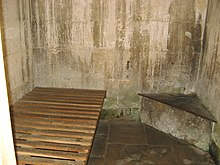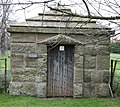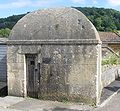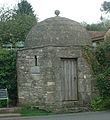Village lock-up


A village lock-up is a historic building once used for the temporary detention of people in England and Wales, mostly where official prisons or criminal courts were beyond easy walking distance. Lockups were often used for the confinement of drunks, who were usually released the next day, or to hold people being brought before the local magistrate. The archetypal form comprises a small room with a single door and a narrow slit window, grating or holes. Most lock-ups feature a tiled or stone-built dome or spire as a roof and are built from brick, stone and/or timber.
Such a room was built in many shapes; many are round, which gives rise to a sub-description: the punishment or village round-house (Welsh: rheinws, rowndws).[1][2] Village lock-ups, though usually freestanding, were often attached to walls, tall pillar/tower village crosses or incorporated into other buildings. Varying in architectural strength and ornamentation, they were all built to perform the same function.
Nicknames and forms
[edit]They have acquired local nicknames and descriptions including blind-house, bone-house, bridewell, village cage, punishment cage, jug, kitty, lobby, guard-house, round-house/roundhouse, tower and watch-house.
Rise of the village lock-up
[edit]The majority of surviving village lock-ups date from the 18th and 19th centuries when rural communities struggled to police thefts, burglaries, shootings, drunkenness, the obstruction of watchmen and the stealing of livestock. During this period a number of lock-ups were built, by official decree, as a temporary place of detention for local rogues and miscreants until they could be removed to a town. For example, in 1790 the Derbyshire court of quarter sessions issued an order that required that "all parishes in the county where there is not already a Round House, House of correction, or Gaol, shall provide a place of temporary confinement for the reception of vagrants, paupers, felons and the like".[3] Over time they became synonymous with drunkenness and many references to this coupling can be found in famous works of literature, including Barnaby Rudge (1841) by Charles Dickens, and The Water-Babies (1863) by Charles Kingsley, which contains the line:
- Put him in the round house till he gets sober[4]
An 1830 description of a lock-up in Taunton describes "... a hole into which drunken and bleeding men were thrust and allowed to remain until the following day when the constable with his staff of office take the poor, crippled and dirty wretches before a magistrate, followed by half the boys and idle fellows of the town".[5]
Some lock-ups also had stocks, ducking stools, pillories, or pinfolds, alongside them and the origins of the 18th-century village lock-up evolved from much earlier examples of holding cells and devices.
The Oxford English Dictionary refers to a round-house as a place of detention for arrested persons and dates its first written usage to 1589.[6][full citation needed]
Decline and later uses
[edit]The rooms fell out of use when the County Police Act 1839 was introduced and more stations were built with their own holding facilities. The Act allowed justices of the peace to set up a paid police force in each county and made it compulsory for that force to be provided with proper police stations and secure cells. The village lock-up became a redundant edifice as a result and only a small fraction have survived.
During World War II many were used by the Home Guard as sentry posts and arms stores.
In recent decades many owners have repaired these structures and/or seen nomination as listed buildings; a presumption of acceptance applies to buildings earlier than 1840. Some are local heritage attractions; others are in a ruinous state; others have been converted into parts of homes, yards or gardens.
A register of these structures, including those which have been lost, is held by the Village Lock-up Association.
Notable village lock-ups
[edit]The crest of Everton Football Club features Everton Lock-Up which still stands on Everton Brow, Liverpool.
D. H. Lawrence and his German-born wife Frieda had to report to the lock-up in Wirksworth during the First World War when they lived at Middleton-by-Wirksworth.[7]
In 1281 an analogous building (the Tun) was erected in Cornhill, central London – a two-storey barrel shaped design with a single cell on each floor.[8]
Surviving lock-ups in England and Wales
[edit]This section needs additional citations for verification. (February 2014) |
England
[edit]- Bedfordshire
Barton-le-Clay,[9] Clophill,[10] Harrold,[11] Silsoe[12]
- Berkshire
Aldermaston,[13] Pangbourne[14]
- Bristol (City of)
- Buckinghamshire
Amersham,[16][a] Great Missenden,[17] Wendover,[18][19][a] West Wycombe[20][21][a]
- Cambridgeshire
Broughton,[22] Burwell,[23] Coveney,[24] Eaton Socon,[25] Fen Drayton,[26] Fenstanton,[27] Litlington,[28] (Holywell-cum-)Needingworth,[29] Parson Drove,[30] Sawtry[31]
- Cheshire
Farndon,[32] Farnworth,[33] Kelsall,[34][a] Winsford[35]
- Cumbria
- Derbyshire
Alfreton,[37] Ashbourne?,[38] Curbar,[39][40] Cromford (Derwent Valley Mills),[41][42][a] Sandiacre,[43] Smisby,[44] Swarkestone (ruin),[45][46] Ticknall,[47] Wirksworth[7][48][a]
- Dorset
Gillingham,[49] Lyme Regis,[50][51][a] Swanage[52][53]
- Durham
Barnard Castle,[54][55][a] Staindrop[56][a]
- East Sussex
Alfriston, Lewes, Pevensey[57]
- Essex[58]
Bradwell-on-Sea,[59] Braintree,[60] Canewdon,[61] Great Bardfield,[62] Great Dunmow,[63] Orsett,[64] Steeple Bumpstead,[65] Thaxted (in Guildhall[66]),[67] Tollesbury[68]
- Gloucestershire
Bisley,[69] Bibury, Cirencester,[70] Moreton-in-Marsh, Stroud,[a] Thornbury,[71] Westerleigh[a]
- Greater London
Cranford,[72][73] Hampstead,[a][74] Petersham[75]
- Hampshire
Easton (demolished),[76] Odiham[77]
- Herefordshire
Bridstow,[78][79] Leintwardine,[a] Yarpole[a]
- Hertfordshire
Anstey,[80] Ashwell, Barley, Buntingford, Shenley[81]
- Kent
Dartford, Lenham, Wateringbury[82]
- Lancashire
Bury, North Meols, Poulton le Fylde?, Prescot
- Leicestershire
Barrow-upon-Soar, Breedon-on-the-Hill, Castle Donington?, Packington,[83] Worthington
- Lincolnshire
- Merseyside
- Norfolk
Docking, Horsham St Faith, Great Yarmouth, Thetford?, Walsingham?
- Northamptonshire
Weldon
- Northumberland
- Nottinghamshire
Edwinstowe?, Mansfield Woodhouse?, Tuxford[88]
- Oxfordshire
Banbury,[a] Bicester,[a] Burford,[a] Filkins, Stonesfield, Wheatley[89]
- Shropshire
Prees[90]
- Somerset
Bathford, Buckland Dinham,[91] Castle Cary, Frome, Kelston, Kilmersdon, Kingsbury Episcopi,[92] Mells,[93] Merriott, Monkton Combe,[94] Nunney,[95] Publow in Pensford,[96] Nether Stowey,[97] Watchett, Wells,[a] Wrington[a]
- Staffordshire
Alton,[98] Gnosall, Penkridge,[99] Stafford: Forebridge[100]
- Suffolk
Sproughton, Stoke by Nayland, Woolpit
- Sussex
- Surrey
Charlwood,[102] Ewell, Lingfield
- Wiltshire
Box, Bradford-on-Avon, Bromham,[103] Chippenham, Devizes, Great Bedwyn, Heytesbury, Hilperton, Lacock, Luckington,[104] Shrewton, Steeple Ashton, Trowbridge,[105] Warminster
- Yorkshire
Addingham?, Fairburn, Illingworth, Heptonstall, Holmfirth (Holm Valley),[106] Hunmanby,[107] Workhouse Farm of Holme upon Spalding Moor[108] Horbury in Wakefield,[109] Kirkheaton, Luddenden, Nether Poppleton?, North Stainley?, Oswaldkirk, Rastrick, Rotherham, Seamer, Snaith,[110] Throp Arch, Topcliffe?, Wath-upon-Dearne[111][a]
Wales
- Flintshire
- Gwynedd
- Wrexham
- Notes
Gallery
[edit]-
Alfriston lock-up
-
Alton lock-up
-
Amersham Lock-up
-
Bathford lock-up
-
Bisley lock-up
-
"The Blind House", Box
-
Bradford-on-Avon lock-up
-
Braintree Cage
-
Old Prison, Bridstow
-
Bromham lock-up
-
Canewdon lock-up, made circa 1775
-
Castle Cary lock-up
-
Clophill lock-up
-
Deeping St James lock-up
-
Digby lock-up
-
Everton lock-up
-
Fenstanton lock-up clock tower
-
Gnosall lock-up
-
Harrold lock-up
-
Hampstead lock-up
-
House of Correction, Hawarden
-
Hilperton lock-up
-
Hunmanby lock-up
-
Kelsall lock-up
-
Monkton Combe lock-up
-
Packington lock-up
-
Pangbourne lock-up
-
Pensford lock-up
-
Watchman's hut/lock-up & pound Petersham, London, erected in 1787
-
The Roundhouse, Ruabon
-
Silsoe lock-up
-
Snaith Town lock-up
-
Steeple Ashton lock-up
-
Tollesbury lock-up
-
Trowbridge Blind House
-
Warminster lock-up
-
Wavertree lock-up
-
Church Loft, West Wycombe
See also
[edit]References
[edit]- ^ "Geiriadur Prifysgol Cymru". welsh-dictionary.ac.uk.
- ^ "Clynnog Fawr Lock-up". 19th Century Prison History.
- ^ Hales, Joy (5 March 2018). "Monumental Musings: The history of village lock-ups in Derbyshire". Derbyshire Life. Great British Life. Retrieved 12 November 2022.
- ^ Kingsley, Charles (1863). The Water-Babies, A Fairy Tale for a Land Baby.
- ^ Worthington Parish Council, The Round House Worthington (pamphlet), North West Leicestershire District Council
- ^ Oxford English Dictionary
- ^ a b "Wirksworth County Lock Up House". Prison History. Retrieved 15 March 2020.
- ^ "Cornhill, Gracechurch Street, and Fenchurch Street'". Old and New London. 1878. pp. 170–183.
- ^ Page, William, ed. (1908). "Parishes: Barton in the Clay". A History of the County of Bedford. Vol. 2. London: Victoria County History. pp. 308–313. Retrieved 4 March 2020 – via British History Online.
There is an ancient round-house or lock-up, a red-brick building with a lead roof, but it has not been used for some years.
- ^ Historic England. "Village lock-up and pound, Clophill (Grade II) (1137830)". National Heritage List for England. Retrieved 7 March 2020. Walled pound. Cell indifferent to a small garage, corbelled brick cornice to squat pyramid slate roof.
- ^ Historic England. "The Lock Up, Harrold (Grade II) (1159459)". National Heritage List for England. Retrieved 7 March 2020. Round limestone rubble, wooden lintel to door, very tall conical stone roof and small ball finial.
- ^ Historic England. "Village Lock Up, Silsoe (Grade II) (1113777)". National Heritage List for England. Retrieved 7 March 2020.
- ^ Historic England. "Lock up Approximately 25 Metres to North of Hind's Head Inn (Grade II) (1117349)". National Heritage List for England. Retrieved 7 March 2020.
- ^ Historic England. "Lock up Approximately 10 Metres to South of Church Cottage (Grade II) (1214020)". National Heritage List for England. Retrieved 7 March 2020.
- ^ Historic England. "Lock Up, City of Bristol (Grade II) (1282059)". National Heritage List for England. Retrieved 7 March 2020.
- ^ "Amersham Lock-Up". Prison History. Retrieved 7 March 2020.
- ^ Historic England. "The Wagon and Horses Public House with Outbuilding to South (Grade II) (1332542)". National Heritage List for England. Retrieved 7 March 2020.
- ^ Historic England. "Clock Tower with Attached Wall and Drinking Fountain (Grade II) (1332853)". National Heritage List for England. Retrieved 7 March 2020.
- ^ "Wendover Lock-Up". Prison History. Retrieved 7 March 2020.
- ^ Historic England. "The Church Loft (Grade II*) (1125134)". National Heritage List for England. Retrieved 7 March 2020.
- ^ "West Wycombe Lock-Up". Prison History. Retrieved 7 March 2020.
- ^ Historic England. "Lock Up, Broughton (Grade II) (1128527)". National Heritage List for England. Retrieved 12 March 2020.
- ^ "Burwell Lock Up". Prison History. Retrieved 12 March 2020.
- ^ Historic England. "Pound and Lockup, Coveney (Grade II) (1127003)". National Heritage List for England. Retrieved 12 March 2020.
- ^ Historic England. "Village Lock-Up (The Cage) [Eaton Socon] (Grade II) (1330629)". National Heritage List for England. Retrieved 12 March 2020.
- ^ Historic England. "Village Lock Up, Fen Drayton (Grade II) (1127231)". National Heritage List for England. Retrieved 12 March 2020. Two cells.
- ^ Historic England. "Clock Tower Lock Up, Fenstanton (Grade II) (1309432)". National Heritage List for England. Retrieved 12 March 2020.
- ^ Historic England. "Village Lock Up, Litlington (Grade II) (1128246)". National Heritage List for England. Retrieved 12 March 2020.
- ^ Historic England. "Lock Up, Needingworth (Grade II) (1128459)". National Heritage List for England. Retrieved 12 March 2020.
- ^ Historic England. "Former Lockup, About 50 Yards South West of Swan Inn (Grade II) (1310221)". National Heritage List for England. Retrieved 12 March 2020.
- ^ Historic England. "Village Lockup Rear Number 14 The Green (Grade II) (1309484)". National Heritage List for England. Retrieved 12 March 2020.
- ^ Historic England. "Village Lockup [Farndon] (Grade II) (1228751)". National Heritage List for England. Retrieved 26 September 2018.
- ^ Historic England. "Bridewell, adjacent to St Luke's Church [Farnworth] (Grade II) (1330353)". National Heritage List for England. Retrieved 12 March 2020.
- ^ Historic England. "Lock Up on the end of the barn at Weldon House [Kelsall] (Grade II) (1130532)". National Heritage List for England. Retrieved 8 March 2015.
- ^ Historic England. "Cross Base and Lock-Up [Winsford] (Grade II) (1310425)". National Heritage List for England. Retrieved 12 March 2020. Very square pyramid resembling an oversized modern war memorial base, nine plain stone courses, stone cross on top.
- ^ Historic England. "Village Lock-up, Lower Allithwaite (Grade II) (1087160)". National Heritage List for England. Retrieved 13 March 2020.
- ^ Historic England. "House of Confinement, Alfreton (Grade II) (1109033)". National Heritage List for England. Retrieved 13 March 2020.
- ^ "Ashbourn County Lock Up House". Prison History. Retrieved 13 March 2020.
- ^ Historic England. "Lock-Up 250 yards north east of Lane Farm, Curbar (Grade II) (1088216)". National Heritage List for England. Retrieved 15 March 2020.
- ^ "Curbar Lock-up". Prison History. Retrieved 15 March 2020.
- ^ Historic England. "The Old Village Lock up to Rear of Number 21 Swift's Hollow [Cromford] (Grade II) (1248427)". National Heritage List for England. Retrieved 15 March 2020.
- ^ "Cromford Lock-Up". Prison History. Retrieved 15 March 2020.
- ^ Historic England. "Village Lock-Up and Pound, Sandiacre (Grade II) (1334852)". National Heritage List for England. Retrieved 15 March 2020. With large pound, plaque noting 1660 founding, later reconstruction.
- ^ Historic England. "The Lock up (round House), Smisby (Grade II*) (1281737)". National Heritage List for England. Retrieved 15 March 2020. Octagonal very tall brick roof, two stone courses, ball finial.
- ^ "Swarkestone Lock-Up". Prison History. Retrieved 15 March 2020.
- ^ "DERBYSHIRE. Lock-ups at Sandiacre, Smisby, Ticknall and Swarkestone". Roy's blog (blog post). 9 April 2013. Retrieved 15 March 2020.
I understand that there was a lock-up at Swarkestone near to the pub. Now just a pile of stones waiting to be rebuilt?
- ^ Historic England. "The Lock-Up, Ticknall (Grade II*) (1096445)". National Heritage List for England. Retrieved 15 March 2020.
- ^ "The History". Wirksworth: The Old Lockup B&B. Retrieved 15 March 2020. Now a B&B.
- ^ Historic England. "Lock-up, Gillingham (Grade II) (1324574)". National Heritage List for England. Retrieved 28 March 2020.
- ^ Historic England. "The Guildhall, Lyme Regis (Grade II*) (1228691)". National Heritage List for England. Retrieved 28 March 2020.
- ^ "Lyme Regis Borough Lock Up". Prison History. Retrieved 28 March 2020.
- ^ Historic England. "The old prison and pump, Swanage (1002727)". National Heritage List for England. Retrieved 28 March 2020.
- ^ "Swanage Lock-up". Prison History. Retrieved 28 March 2020.
- ^ Historic England. "Market Cross, Barnard Castle (Grade I) (1201323)". National Heritage List for England. Retrieved 29 March 2020.
- ^ "Barnard Castle Lock-Up". Prison History. Retrieved 29 March 2020.
- ^ "Staindrop Lock-Up". Prison History. Retrieved 29 March 2020.
- ^ Historic England. "The Court House and Wallby (Grade II) (1182588)". National Heritage List for England. Retrieved 29 March 2020.
- ^ Bettley, James (2007). Essex (Buildings of England series). New Haven and London: Yale UP. ISBN 978-0300116144.
- ^ Historic England. "Village lock-up with stocks and whipping post attached to door-frame, south east corner of Churchyard of St. Thomas, Bradwell-on-Sea (Grade II) (1337396)". National Heritage List for England. Retrieved 18 April 2020.
- ^ Historic England. "The Cage or Lock Up (Grade II) (1338314)". National Heritage List for England. Retrieved 8 December 2015.
- ^ Historic England. "Canewdon (1147585)". National Heritage List for England. Wooden, stocks locked up inside.
- ^ Historic England. "The Great Bardfield Cage (Grade II) (1123505)". National Heritage List for England. Retrieved 18 April 2020.
- ^ "Great Dunmow Lock-Up". Prison History. Retrieved 18 April 2020.
- ^ Historic England. "Village Lock-up or Cage, Thurrock (Grade II) (1111609)". National Heritage List for England. Retrieved 18 April 2020.
- ^ Historic England. "Lock-up approx. 30 metres NW of Parish Church (Grade II) (1122309)". National Heritage List for England. Retrieved 18 April 2020.
- ^ Historic England. "Guildhall, Thaxted (Grade I) (1112905)". National Heritage List for England. Retrieved 18 April 2020.
- ^ "Thaxted Lock-Up". Prison History. Retrieved 18 April 2020.
- ^ Historic England. "The Cage, immediately south-west of no. 7, Tollesbury (Grade II) (1141669)". National Heritage List for England. Retrieved 18 April 2020.
- ^ Shipman, Juliet. The Bisley Lock-up: A story of crime and punishment.
- ^ Historic England. "Canewdon (1187695)". National Heritage List for England. Partition inside, of stone and slate.
- ^ Historic England. "Thornbury (1321133)". National Heritage List for England.
- ^ "Cranford Village Lock Up". Heritage of London Trust. 2016. Retrieved 8 November 2018.
- ^ Historic England. "The Village Lock-up (also known as the Round House) (Grade II) (1080306)". National Heritage List for England. Retrieved 8 November 2018.
- ^ Historic England. "Old Parish Lock-up, Hampstead (1272513)". National Heritage List for England.
- ^ Fison, Vanessa (2009). The Matchless Vale: the story of Ham and Petersham and their people. Ham and Petersham Association. pp. 104–105. ISBN 978-0-9563244-0-5.
- ^ "Easton Lock-up". Prison History. n.d. Retrieved 5 April 2022.
- ^ "Odiham County Bridewell". Prison History. n.d. Retrieved 5 April 2022.
- ^ "Bridstow (Wilton) Lock-Up". Prison History. n.d. Retrieved 11 October 2024.
- ^ Historic England. "Old Prison (Grade II) (1288739)". National Heritage List for England. Retrieved 11 October 2024.
- ^ Historic England. "Lychgate (Grade II) (1101869)". National Heritage List for England. Retrieved 4 March 2020.
- ^ "The Cage, London Road, Shenley, Hertfordshire". Historic England. Retrieved 24 December 2019.
- ^ Historic England. "Wateringbury (1186252)". National Heritage List for England.
- ^ Historic England. "Packington (1074344)". National Heritage List for England. Octagonal with tall brick roof and ball finial.
- ^ Historic England. "Digby (1254194)". National Heritage List for England. In stone, former wellhead, ogee-domed stone cap with ball finial.
- ^ Historic England. "Everton (1062539)". National Heritage List for England. On green of Everton Brow.
- ^ Historic England. "Wavertree (1068320)". National Heritage List for England.
- ^ Historic England. "Stamfordham (1178865)". National Heritage List for England.
- ^ Historic England. "Tuxford (1224354)". National Heritage List for England.
- ^ Historic England. "Wheatley (1047479)". National Heritage List for England. Tall, hexagonal unstepped, stone pyramid with ball finial.
- ^ Historic England. "Prees (1236333)". National Heritage List for England.
- ^ Historic England. "Buckland Dinham (1174096)". National Heritage List for England.
- ^ Historic England. "Kingsbury Episcopi (1057720)". National Heritage List for England., octagonal with ball finial
- ^ Historic England. "Mells (1058320)". National Heritage List for England.
- ^ Historic England. "Monckton Combe (1288263)". National Heritage List for England.
- ^ Historic England. "Nunney (1174628)". National Heritage List for England.
- ^ Historic England. "Publow (1129494)". National Heritage List for England.
- ^ "Nether Stowey Lock-up". 19th Century Prison History. Retrieved 24 December 2019.
- ^ Historic England. "Alton (1374689)". National Heritage List for England. Has a quite small cupola above dome.
- ^ Historic England. "Penkridge (1039218)". National Heritage List for England. Has small, dentillated eaves.
- ^ Historic England. "Stafford (1195356)". National Heritage List for England.
- ^ Historic England. "East Grinsted: combined gaol cell with residence of town constable (1249132)". National Heritage List for England.
- ^ Historic England. "Charlwood (1277887)". National Heritage List for England.
- ^ Historic England. "Bromham (1365574)". National Heritage List for England.
- ^ Historic England. "Luckington (1283174)". National Heritage List for England.
- ^ Historic England. "Trowbridge (1283671)". National Heritage List for England.
- ^ Historic England. "Holmfirth (1313578)". National Heritage List for England.
- ^ Historic England. "Hunmanby (1168000)". National Heritage List for England. Two entrances, one per cell.
- ^ Historic England. "Lockup at Workhouse Farm (1376869)". National Heritage List for England. (No longer worked by the poor, latterly by those of the local poor law union of parishes.)
- ^ Historic England. "Horbury (1135517)". National Heritage List for England.
- ^ Historic England. "Snaith & Cowick (1161768)". National Heritage List for England.
- ^ Historic England. "Wath upon Dearne (1314579)". National Heritage List for England. Constable's cell above with fireplace, both with latrines/later toilets, enhanced window above today and door with diamond window.
Further reading
[edit]- Plumridge, Andrew. The National Directory of Village Lock-Ups, Stocks, Pillories, Gallows, Gibbets, Pounds and Pinfolds, and Other Pre-Police Force Punishment and Detention Devices.







































